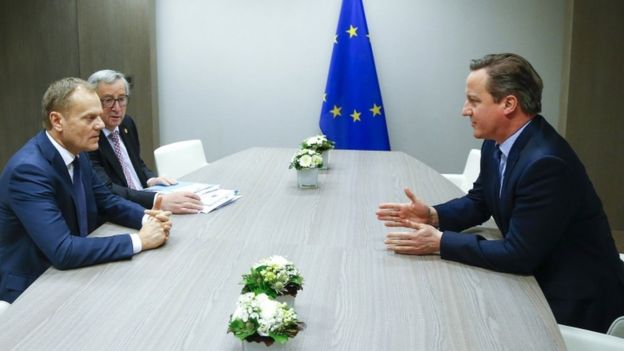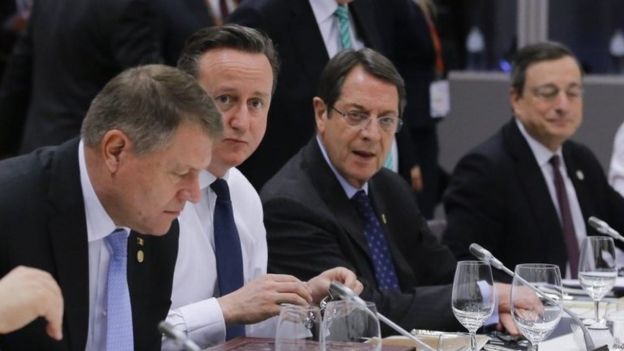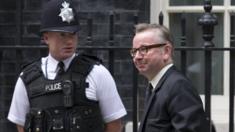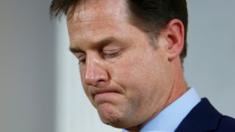- 16 minutes ago
- UK Politics
David Cameron says a deal struck with EU leaders will give the UK "special status" and he will campaign with his "heart and soul" to stay in the union.
The PM said the agreement, reached late on Friday after two days of talks in Brussels, would include a seven-year "emergency brake" on welfare payments.
He added the deal included changes to EU treaties and would be presented to his cabinet on Saturday at 10:00 GMT.
EU exit campaigners said the "hollow" deal offered only "very minor changes".
The unanimous agreement reached at the EU summit was first announced by European Council president Donald Tusk.
A key sticking point - child benefit curbs - will apply to existing claimants from the start of 2020 and to new claimants as soon as new laws have been passed.
The UK will also be able to enact emergency safeguards to protect the City of London, Downing Street said, and EU treaties will be amended to state explicitly that references to the requirement to seek ever-closer union "do not apply to the United Kingdom".
German Chancellor Angela Merkel predicted the package of reforms would "elicit support in the UK for the country to remain in the EU".
Once Mr Cameron has briefed his ministers at Saturday's cabinet meeting, they will be free to campaign for either side in the referendum, which has been promised by the end of 2017 but is expected in June.
Mr Cameron said he would shortly announce the date of the referendum and said he was "disappointed" but not surprised that one of his key allies, Justice Secretary Michael Gove, was to campaign for the UK to leave the EU.
Analysis by Laura Kuenssberg, BBC political editor
The ink is hardly dry on the UK's EU deal, but immediately the focus has switched to the substance of what David Cameron has achieved and - possibly an awkward question - how many of his colleagues will argue against him.
The focus will move to whether the prime minister can keep his party politely together during a period of public disagreement.
The ability to restrict benefits to migrants is an important victory for Mr Cameron - ammunition for his argument that he has achieved changes to help reduce the number of EU migrants coming to live and work in the UK.
The proposals are complicated and do not exactly match the promises he made in the Conservative Party manifesto.
But with it - and the other commitments - it becomes harder for his critics to make the case that the agreement is flimsy and will change nothing.
Mr Cameron said he had achieved the reforms he wanted, claiming they would put the UK "in the driving seat" of one of the world's biggest markets and create a "more flexible" EU.
"The British people must now decide whether to stay in this reformed European Union or to leave," he said.
"This will be a once-in-a-generation moment to shape the destiny of our country."
At the same time as the EU reforms, the PM said further measures to strengthen the UK's sovereignty would be announced.
 AP
AP
The deal reached between all 28 EU member states comes after several leaders objected to Mr Cameron's planned reforms.
The original aim had been to conclude the deal at an "English breakfast" meeting on Friday, which became an "English brunch", then an "English lunch" and eventually an "English dinner", at which point the agreement was announced.
Eurosceptics have dismissed the reforms, saying they will not allow the UK to block unwanted EU laws or reduce migration.
Matthew Elliott, chief executive of the Vote Leave campaign, said Mr Cameron "will now declare victory but it is an entirely hollow one".
 European Press Agency
European Press Agency
He disputed the PM's claim that the deal was legally binding, saying it "can be ripped up by EU politicians and unelected EU judges".
As the EU summit was being concluded, another EU exit campaign, Grassroots Out, held a rally in Westminster.
Conservative MP David Davis said it was time for Britain "to take control of its own destiny", while UKIP leader Nigel Farage said the cross-party campaign was "absolutely united in fighting to get back our democracy".




No comments:
Post a Comment